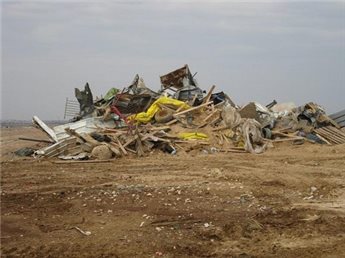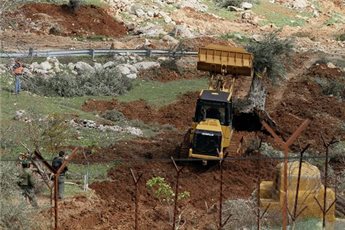Israeli bulldozers, Monday, demolished homes in the Bedouin village of al-Araqib village, in the Negev, for the 83rd time, in addition to a home in the Negev village of Atir, local activists said. Bulldozers also leveled land in al-Khader, in southern Bethlehem.Israeli police reportedly imposed a blockade on al-Araqib before carrying out the demolitions.
Activist Aziz Siyah Abu Mdeighem told Ma’an News Agency: ‘They smile to us after they demolish our homes and ask mockingly, ‘How are you?”
‘It is disrespectful to Palestinians,’ he said, ‘We will stay here even if they demolish al-Araqib 100 times.’
Meanwhile, in Atir in northeastern Hura in the Negev, bulldozers escorted by Israeli police demolished a home in which a family of 12 had been living.
Ibrahim al-Afinsh, who owned the house, said the people of Atir and of the Negev would never give up their rights to their lands.
The activist Abu Mdeighem called on Israel ‘to respect the law, as they claim their country is democratic.’
The activist said that demolitions in al-Araqib continue to take place, even after the Israeli Higher Court of Justice ruled that al-Araqib’s lands do not belong to the state.
He said that local Israeli authorities, who dispute the ruling, have filed a lawsuit demanding the court to order residents of al-Araqib to pay a daily fine of 5,000 shekels.
Abu Mdeighem added: ‘Israel is celebrating its independence by demolishing our homes,’ referring to Israeli ‘Independence Day’ which Israel celebrates on Apr. 23 this year based on the Hebrew calendar.
Palestinians will commemorate the same creation of Israel in 1948 — known among Palestinians as al-Nakba, the catastrophe — on May 15, according to the Gregorian calendar, remembering the violent expulsion of approximately 750,000 Palestinians from the newly created state.
This includes 90 percent of the Palestinian Bedouins who had until then lived in the Negev Desert. Israel confined the remainder to a closed reservation.
Demolitions, in addition to denial of basic services and access to infrastructure, are part of an ongoing campaign by Israeli planning committees against Bedouin villages in the Negev desert, where roughly 70-90,000 people live.
In May 2013, an Israeli government committee approved a draft bill setting a framework to implement the evacuation of ‘unrecognized’ Bedouin villages in the Negev, most of which existed before the state of Israel.
Both Al-Araqib and Atir are among some 40 Negev villages that Israeli authorities have deemed unrecognized, arguing that the 53,000 Palestinian Bedouins living in them cannot prove land ownership.
Some 100 homes in unrecognized villages have been demolished since the beginning of 2015, while Israeli authorities have issued demolition notices to hundreds of others.
— —
Israeli bulldozers also leveled land in the Palestinian town of al-Khader, in southern Bethlehem, on Monday.
Yassin al-Dadou, who owns the 18 dunams of land, said Israeli bulldozers had carried out the action even though he has documents proving his ownership.
He said that his family had spoken with lawyer Ghayyath Nasser in Jerusalem, who told them a court session would review the case on Apr. 28.
Al-Khader’s mayor, Tawfiq Salah, said: ‘We have all papers that prove our ownership of these lands.’
He added that more than eight Israeli bulldozers are currently leveling land in the area.
Al-Khader has suffered heavily under the Israeli occupation.
Of the village’s historic 22,000 dunams, about 20,000 are almost entirely cut off by the Israeli separation wall and house three illegal settlements, Efrat, Elazar and Neve Daniyyel, according to the al-Khader municipality.
These settlements, which cover nearly 2,800 dunams, are part of a larger block, known as Gush Etzion, which accommodates more than 60,000 settlers.
Once an agricultural village, Israeli settlers have seized large swathes of al-Khader’s farmland, and have uprooted olive trees and regularly attack Palestinian farmers trying to reach their land.
Of the village lands within the separation wall, the municipality says that 800 dunams are classified as Area A and 400 dunams Area B under the Oslo Accord.
The remaining 800 dunams are classified Area C, giving Israel full civil and military authority.
As a result, the village is unable to expand, despite a growing population, and Israeli authorities regularly carry out home demolition.
Search IMEMC: ‘Israeli Settlement’


